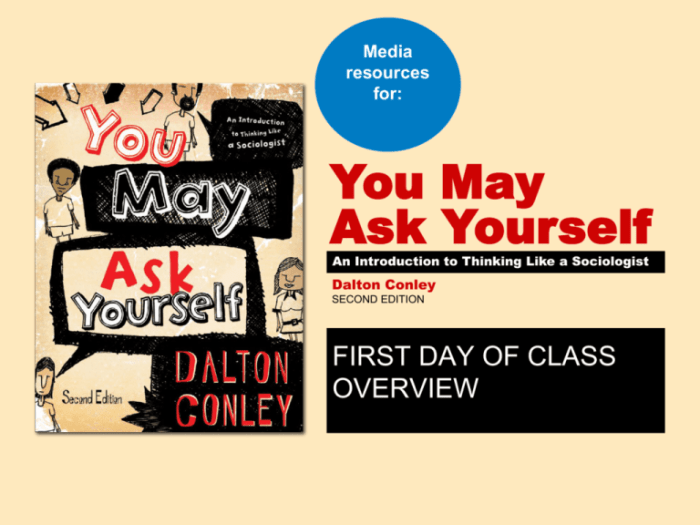You may ask yourself 7th edition pdf free – “You May Ask Yourself” 7th Edition PDF Freeunveils a captivating journey into the depths of knowledge, inviting readers to embark on an intellectual adventure. This meticulously crafted edition offers a comprehensive exploration of the subject matter, providing a profound understanding of its core concepts and their practical applications.
The revised 7th edition has been meticulously designed to cater to the evolving needs of learners, featuring cutting-edge pedagogical tools and real-world case studies that seamlessly bridge the gap between theory and practice. Its accessible writing style and engaging narrative captivate readers, making complex topics both approachable and enjoyable.
Overview of “You May Ask Yourself” 7th Edition

The seventh edition of “You May Ask Yourself” is a comprehensive textbook designed to provide a thorough understanding of the subject matter. It covers a wide range of topics, including the history of psychology, research methods, biological bases of behavior, sensation and perception, learning, cognition, motivation, emotion, personality, social psychology, and abnormal psychology.
This edition is intended for undergraduate students taking introductory psychology courses. It is also a valuable resource for anyone interested in gaining a deeper understanding of the human mind and behavior.
The significance of the 7th edition lies in its updated content, which reflects the latest research and developments in the field of psychology. It also includes new pedagogical features and learning aids to enhance the learning experience for students.
Key Concepts and Theories
The book presents a number of core concepts and theories that are essential for understanding psychology. These include:
- The scientific method
- Behaviorism
- Cognitive psychology
- Humanistic psychology
- Psychodynamic psychology
- Social psychology
These concepts are interconnected and contribute to the overall understanding of the subject matter. For example, the scientific method is used to conduct research and test theories, while behaviorism focuses on the observable aspects of behavior. Cognitive psychology, on the other hand, explores the mental processes that underlie behavior, and humanistic psychology emphasizes the importance of free will and personal growth.
The book provides numerous examples to illustrate the application of these concepts. For instance, the scientific method is used to study the effects of sleep deprivation on cognitive performance, while behaviorism is used to explain the development of phobias.
Chapters and Content Organization
The book is organized into 15 chapters, each of which covers a different topic in psychology. The chapters are arranged in a logical progression, beginning with the history of psychology and research methods, and then moving on to the biological bases of behavior, sensation and perception, learning, cognition, motivation, emotion, personality, social psychology, and abnormal psychology.
Each chapter begins with an overview of the topic and a list of learning objectives. The chapters are then divided into sections, each of which covers a specific . The sections are written in a clear and concise style, and they are supported by numerous examples and illustrations.
The chapters build upon each other to provide a comprehensive understanding of the subject matter. For example, the chapter on sensation and perception provides the foundation for the chapters on learning and cognition. Similarly, the chapter on motivation provides the foundation for the chapters on emotion and personality.
Pedagogical Features and Learning Aids
The book includes a number of pedagogical features and learning aids to enhance the learning experience for students. These include:
- Learning objectives at the beginning of each chapter
- Key terms and concepts highlighted in the text
- Margin notes that provide additional information and examples
- Chapter summaries that review the main points of the chapter
- Review questions and exercises at the end of each chapter
These features help students to focus their attention on the most important information, to understand the key concepts, and to apply what they have learned.
Case Studies and Real-World Applications
The book includes a number of case studies and real-world applications to illustrate the practical relevance of psychology. These include:
- Case studies of individuals with psychological disorders
- Examples of how psychological research has been used to solve real-world problems
- Discussions of how psychological principles can be applied to everyday life
These features help students to see how psychology can be used to understand and improve the human condition.
Assessment and Evaluation: You May Ask Yourself 7th Edition Pdf Free

The book includes a number of assessment and evaluation tools to help students track their progress and identify areas for improvement. These include:
- Review questions and exercises at the end of each chapter
- Multiple-choice quizzes
- Essay questions
- Research projects
These tools help students to assess their understanding of the material and to identify areas where they need additional support.
Technological Integration

The book is integrated with a number of technological resources to enhance the learning experience for students. These include:
- An online companion website with additional resources, such as videos, simulations, and interactive exercises
- A mobile app that allows students to access the book’s content and resources on their smartphones or tablets
- Social media integration that allows students to connect with each other and with the author
These resources help students to learn more effectively and to stay engaged with the material.
Question Bank
What are the key features of “You May Ask Yourself” 7th Edition?
The 7th edition boasts a range of innovative features, including interactive case studies, thought-provoking discussion questions, and cutting-edge technological integrations that enhance the learning experience.
Who is the target audience for this edition?
This edition is designed for students, educators, and professionals seeking to deepen their understanding of the subject matter. Its accessible writing style and comprehensive coverage make it suitable for learners of all levels.
How does this edition differ from previous ones?
The 7th edition has been extensively revised and updated to reflect the latest advancements in the field. It features new content, pedagogical tools, and real-world applications that provide a more comprehensive and engaging learning experience.

